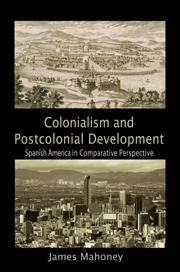Book contents
- Frontmatter
- Contents
- List of Tables, Figures, and Maps
- Preface
- 1 Explaining Levels of Colonialism and Postcolonial Development
- 2 Spain and Its Colonial Empire in the Americas
- 3 Mercantilist Colonialism
- 4 Liberal Colonialism
- 5 Warfare and Postcolonial Development
- 6 Postcolonial Levels of Development
- 7 British and Portuguese Colonialism
- 8 Conclusion
- Notes
- Glossary
- Select Bibliography of Works on Colonial Spanish America
- Index
- Titles in the Series
1 - Explaining Levels of Colonialism and Postcolonial Development
Published online by Cambridge University Press: 05 June 2012
- Frontmatter
- Contents
- List of Tables, Figures, and Maps
- Preface
- 1 Explaining Levels of Colonialism and Postcolonial Development
- 2 Spain and Its Colonial Empire in the Americas
- 3 Mercantilist Colonialism
- 4 Liberal Colonialism
- 5 Warfare and Postcolonial Development
- 6 Postcolonial Levels of Development
- 7 British and Portuguese Colonialism
- 8 Conclusion
- Notes
- Glossary
- Select Bibliography of Works on Colonial Spanish America
- Index
- Titles in the Series
Summary
Much of the developing world was dragged into the modern era by colonialism. However one judges it, this is a historical legacy with which all scholars interested in the political economy of development, especially political economy over the long duration, must come to terms.
– Atul KohliComparative historical analysis serves as an ideal strategy for mediating between theory and history. Provided that it is not mechanically applied, it can prompt both theoretical extensions and reformulations, on the one hand, and new ways of looking at concrete historical cases, on the other.
– Theda SkocpolColonialism was a great force of change in the modern era. From the Americas to the Asian and African continents, colonial expansion brought Europeans and their institutions around the world. It stirred nationalist sentiments and intensified competition within the European core; and the colonies provided an outlet for citizens who sought or were compelled to pursue a new life overseas. By disseminating people and institutions, moreover, colonialism forever changed the structure of trade and production within what had been an almost exclusively European commercial system. Nothing less than a genuinely worldwide system of states and trade was born out of colonialism. In the judgment of Karl Marx and Friedrich Engels, “the colonization of America, trade with the colonies, the increase in the means of exchange and in commodities generally, gave to commerce, to navigation, to industry, an impulse never before known.”
Information
- Type
- Chapter
- Information
- Colonialism and Postcolonial DevelopmentSpanish America in Comparative Perspective, pp. 1 - 34Publisher: Cambridge University PressPrint publication year: 2010
